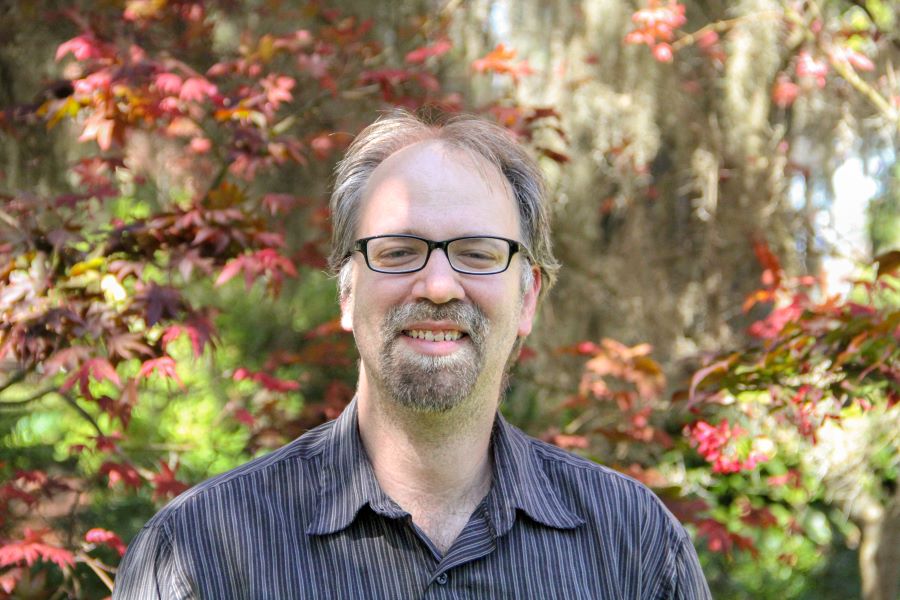Student Spotlight: Paul Anthony

Paul Anthony is pursuing his doctoral degree in American religious history from Florida State University’s Department of Religion, part of the College of Arts and Sciences. Anthony transitioned to academia in 2020 to seek a career as a professor and share his passion for religious history with others. His research interests lie in evangelicalism and fundamentalism, evolution and creationism, and news media.
What year are you in school, and when do you expect to graduate?
I’m in my third year of my doctoral program with hopes to graduate in 2025.
Tell us a little about your background, where you’re from and what brought you to FSU.
I’m from Connecticut but came to FSU from Texas where I earned my bachelor’s in journalism and master’s in modern and American Christianity at Abilene Christian University. After graduation, I spent 15 years in journalism, public relations and media relations. I see myself as a writer first, and I’m happiest when researching and writing about religious history. Once I learned about FSU’s doctoral program in American religious history, it seemed the best fit for me.
What inspired you to pursue a Ph.D. in American religious history?
In undergrad, my plan was always to work in journalism then pursue a doctorate to be able to teach. Overall, I’m too much of a nerd to not pursue knowledge full time.
I grew up in a religious household, so religion has always been important to me. I’m also fascinated with the idea that we can’t understand ourselves without understanding where we came from. History is a river, to paraphrase Ursula K. LeGuin, you can either explore it or get swept away by it. Exploring it is a lot more fun.
What were your motivations behind leaving journalism to pursue your Ph.D.? What was that transition like?
Leaving the journalism industry was challenging, but practices I learned such as explaining complex ideas, researching past influences on the present, and writing in an engaging way have translated well into academia. Transitioning into my academic program has been easier since I’m older now and better at maintaining a healthy work and life balance. I’m enjoying my work for the first time since I left journalism, and my program fulfills me in the same way journalism once did.
What aspect of your area of study do you find most interesting?
I focus on conservative religious groups – fundamentalist or evangelical – and their interactions with broader American culture. Whether it is the evangelical adoption of rock culture to create the multi-million dollar Christian music industry, or efforts by fundamentalist Mormons to isolate themselves from American culture only to be raided by the American state, these historical moments have been influential beyond the people directly involved but mostly overlooked in academia.
Tell us about your experience at the American Academy of Religion/Southeast region Conference and being recognized as the winner of the 2023 AAR/SE graduate student paper prize. What does this award mean to you?
It was the first in-person conference since the COVID-19 pandemic, and that helped bring a lot of energy to it. I’m proud of my paper and the award, but there was so much good work presented that weekend, any number of papers could have won. To receive that kind of recognition from faculty in my field is incredibly gratifying.
How does your award-winning publication “‘Your Women in Texas’: Lottie Beth Hobbs, Churches of Christ, and the Unheralded Networks that Stopped the ERA” contribute to existing and new discourses in your field? Why was this paper important for you to write?
In my paper, I explored the major role of the Churches of Christ in helping to defeat the Equal Rights Amendment, or ERA, which passed in Congress in the 1970s and quickly won ratification in over 30 states. There has been more attention paid recently to the anti-ERA movement among American religious historians, but it tends to focus on Phyllis Schlafly, a prominent anti-ERA figure. My paper demonstrates how the ERA was not only defeated by Schlafly but also because of women like Lottie Beth Hobbs, who was a Sunday school teacher before she led a national movement against the ERA. Most importantly, this paper explores how the ‘religious right’ is more than a movement of conservative men and how it relies on anti-feminist women in ways that have not been investigated yet.
What on-campus resources have you utilized most during your time at FSU?
I encourage anyone to take advantage of the free medical and counseling services students receive from FSU’s Counseling and Psychological Services. Getting a Ph.D. is stressful even in the best of times, so staying physically and mentally healthy is important to me.
Are there any faculty or staff who have helped or inspired you? Why/how so?
The Department of Religion faculty have been so helpful and encouraging. My recent award-winning paper began as an assignment in associate professor of religion Mike McVicar’s class on American conservatism, and his feedback has been crucial. Sonia Hazard, assistant professor of religion, has also been great at demystifying the publishing process and providing a better sense of how to turn a cool idea into a publishable paper.
What do you like to do when you’re not doing schoolwork or research?
I have three kids, so I spend my free time hanging out with them. Before graduate school, my hobby was reading, which is now more or less my full-time job! I also love hanging out with friends and going to the movies.
What advice do you have for fellow students?
Structure your time, but be flexible. Grad school is easier when you treat it like a job, which means ‘clocking out’ for the day and doing something other than work. Learn to accept that things do not always go according to plan, and it’s important to bounce back after rejection. With warm winters and plenty of beaches and forests nearby, don’t miss the opportunity to give yourself a change of scenery.
